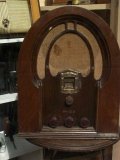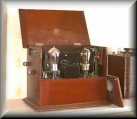Reverberation (echo)
| Putting reverb (echo) on dialogue has to be done with caution. You can distort the words very easily. Take it little-by-little. |
| If you work on the computer, SAVE THE ORIGINAL DIALOGUE, so you can go back to it. Then treat the dialogue just 10%, listen to the result, SAVE IT AS A DRAFT. Then treat it another 10%. SAVE THIS AS A DRAFT. |
|
Continue on with this procedure until you over-shoot, and it is distorted. And then listen backwards to your draft versions, and decide. To repeat - just a touch of echo should do the job. The context of the scene, and Description or added words in the dialogue to fill in what is 'blind' for the listener, should do the rest. |
| Reverberation (echo) - see http://www.answers.com/topic/reverberation. In an enclosed space, multiple reflections are built up. These build up, blend and then fade. It is difficult to hear speech. |
This site is 'Radio Drama - directing, acting, technical, learning & teaching, researching, styles, genres'. See INDEX to navigate also. Complete curriculum of scripts, techniques (acting & directing & post-production & genre styles), advice, sound files - effects and atmoses (with no copyright and so free to use), detailed script commentaries, etc.
TECHNIQUES - FULL RANGE OF RADIO DRAMA TECHNIQUES ON THESE SITES
Academic material on this site is
Alan Beck is licensed under a Creative Commons Attribution-Non-Commercial-Share Alike 2.0 UK: England & Wales License.
Learn about radio drama on this site along with my book - Beck, Alan, Radio Acting, London: A & C Black ISBN 0-7136-4631-4 Available on Amazon. CLICK HERE.
To the WELCOME PAGE for Alan Beck's sites. See more of Alan Beck's work.
Any opinions expressed in this site are the personal opinions of the owner of the site. IF YOU HAVE COMMENTS, PLEASE EMAIL TO : [email protected]


